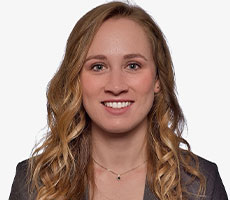The Duty to Vote
The Case for a Civic Engagement Curriculum in Medical Education
Robert | Family Medicine Oct 14, 2020
As a second year medical student at the University of Colorado, Monica Patten serves as the Co-President for the CU student chapter of the Colorado Medical Society, as well as the Co-President for the nationally affiliated Medical Student Pride Alliance. She is a member of the LEADS Leadership and Advocacy track at CU, and hopes to integrate health policy work and advocacy as a core component of her future career.
"If medicine is really to accomplish its great task,
it must intervene in political and social life."
Rudolf Virchow, 18491
As our nation grapples with the ongoing consequences of the COVID-19 pandemic, healthcare professionals are faced with an uncomfortable truth about medicine: Politics controls our local, national and global public health responses. With every “Stay at Home” order lifted, every social distancing measure adopted or rejected, and every dismissal of the efficacy of wearing a mask by elected officials, we are reminded that those who possess the medical or scientific knowledge required to lead the nation through a health crisis of this magnitude are not endowed with the power to do so. Those who make policy decisions regarding COVID-19 must choose to heed the expertise of healthcare professionals when it comes time to allocate PPE, negotiate contracts for ventilator production and, most importantly, communicate public health information.
Indeed, it is more apparent than ever that health care is not an apolitical undertaking. In order to successfully promote the health and safety of our communities, the complex relationship between the medical profession and politics necessitates a foundation of trust. Traditionally, it would seem, this foundation of trust has been assumed by the medical community. We cannot rely on every elected public official to have the best interest of our patients and our colleagues in mind when making health policy decisions. Rather, health professionals must engage in the political process as key stakeholders. Importantly, they must vote. Yet, a 2007 study on physician professionalism demonstrated that physicians have lower adjusted voting rates than the general population and also lower voting rates than other professions, such as law. 2
This is why civic engagement must be a core component of the professionalism we teach in U.S. medical schools and residency programs. A survey of seven U.S. medical institutions found that medical students feel a professional responsibility to engage in health policy.3 Students understand that health policy decisions directly impact the way they will practice and the health of their future patients. Students understand that in a country where health care makes up about one-fifth of the gross domestic product and voters consistently identify health care as one of their main concerns, it would be short-sighted to dismiss civic engagement as less than a core component of medical education. However, it is not as clear what “civic engagement” looks like.
Voting is one critical component of civic engagement that is often overlooked. In 2012 the National Study of Learning and Voting Engagement began collecting data on student voter registration and voting rates at colleges and universities. The study found that a campus culture of civic engagement and discourse on public issues are the primary predictors of voting by students.4
According to the Liaison Committee on Medical Education (LCME), the accrediting body for all U.S. medical schools, medical school curricula must address not only the biomedical and behavioral sciences, but also the “socioeconomic sciences,” “societal problems” and the “recognition of the impact of disparities in health care … and potential methods to eliminate health care disparities.” 5 Therefore, civic engagement, including the responsibility to vote, must be a core component of the professionalism curriculum for medical students, not only to meet the requirements of the LCME, but more broadly, to fulfill the trust that society places in physicians.
Encouraging medical students to vote and promoting civic engagement through consistent and mandatory medical education curricula is the first step in solidifying voting as a core professionalism standard for physicians. If we cannot train future physicians to utilize their unique experiences and medical expertise in selecting our government leaders, we will miss the moment we have now to influence politics, address longstanding societal ills, and safeguard our patients from the devastating toll of future global health crises.
- Virchow R. 1849. Quoted in Farmer P. Pathologies of Power. Health, Human Rights and the New War on the Poor. University of California Press Books, 2004.
- Grande D, Asch DA, Armstrong K. Do doctors vote?. J Gen Intern Med. 2007;22(5):585-589. doi:10.1007/s11606-007-0105-83.
- Rook JM, Winkelman TNA, Fox JA, et al. Looking to the Future: Medical Students' Views on Health Care Reform and Professional Responsibility. Acad Med. 2019;94(9):1361-1368. doi:10.1097/ACM.00000000000026214.
- Matto E, Millett McCartney A, Bennion E, Simpson D. Teaching Civic Engagement Across The Disciplines.; 2017:47-53.5.
- Liaison Committee on Medical Education. Functions and Structure of a Medical School. Standards for Accreditation of Medical Education Programs Leading to the MD Degree. March, 2020: Association of American Medical Colleges and American Medical Association. Washington, D.C.